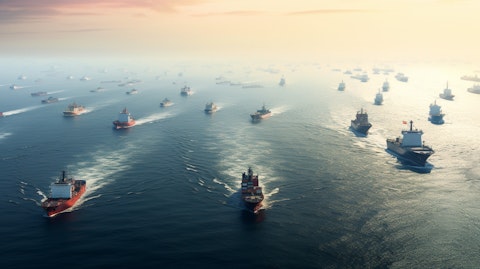Danaos Corporation (NYSE:DAC) Q3 2025 Earnings Call Transcript November 18, 2025
Operator: Good day, and welcome to the Danaos Corporation conference call to discuss the financial results for the 3 months ended September 30, 2025. As a reminder, today’s call is being recorded. Hosting the call today is Dr. John Koustas, Chief Executive Officer of Danaos Corporation; and Dr. Evangelos Chatzis, Chief Financial Officer of Danaos Corporation. Dr. Koustas and Mr. Chatzis will be making some introductory comments, and then we will open the call to a question-and-answer session. I would now like to turn the conference over to Mr. Evangelos Chatzis, Chief Financial Officer. Please go ahead, sir.
Evangelos Chatzis: Thank you, operator, and good morning to everyone. Before we begin, I quickly want to remind everyone that management’s remarks this morning may contain certain forward-looking statements and that actual results could differ materially from those projected today. These forward-looking statements are made as of today, and we undertake no obligation to update them. Factors that might affect future results are discussed in our filings with the SEC, and we encourage you to review these detailed safe harbor and risk factor disclosures. Please also note that where we feel appropriate, we will continue to refer to non-GAAP financial measures such as EBITDA, adjusted EBITDA, adjusted net income, time charter equivalent revenues and time charter equivalent dollars per day to evaluate our business.
Reconciliations of non-GAAP financial measures to GAAP financial measures are included in our earnings release and accompanying materials. With that, let me now turn the call over to Dr. John Koustas, who will provide the broad overview of the quarter.
John Coustas: Thank you, Evangelos. Good morning, and thank you all for joining today’s call to discuss our results for the third quarter of 2025. As we enter the final months of the year, operating conditions remain broadly unchanged. The war in Ukraine continued with no end in sight. And while the conflict in the Middle East is in the process of resolution, transit through the Red Sea has not yet resumed and liners are waiting for more permanent signs of stability to restart the transit. The recent escalation in trade and tariff tensions between the United States and China enabled trade to resume unhindered while the redirection of Chinese exports to the EU and other countries kept trading and container traffic at an all-times high during the third quarter of the year.
The charter market remains robust and the idle fleet remains at all-time low. Demand for midsized and larger vessels continues unabated, and we have secured new charters for vessels opening as far out as the beginning of 2028. Shipyard slots for 2028 deliveries are becoming scarce and newbuilding prices continue to rise. We have selectively extended our newbuilding program at below market prices, and we have already secured multiyear employment for these new orders. Following the IMO’s 1-year postponement of its net zero framework, we expect conventional fuels to remain prevalent in the medium term, even long-term decarbonization trajectory is unchanged. In relation to our newbuilding program, we recently added six 1,800 TEU vessels to our order book with scheduled deliveries between 2027 and 2029 and have secured 10-year charters for 4 of these vessels with a contribution to our contracted revenue backlog of approximately $236 million.
On the financing front, we recently completed a $500 million unsecured 7-year bond offering with a 6.85% coupon. This is one of the most competitively priced deals ever achieved in the shipping industry for an unsecured bond with such tenor and is a testament of our superior credit quality. We intend to use the proceeds to redeem our 2028 $300 million bond as well as prepay in full some smaller secured bank credit facilities. We have already arranged secured debt financing for the majority of our newbuilding program and our fortress balance sheet that has been solidified with the recent bond issuance considerably enhances our capacity to pursue accretive investment opportunities that can propel the growth of Danaos into the next level. Our solid performance has enabled us to continue to deliver strong profitable performance, enhance our contract backlog and fund investments to reduce the age of our fleet and further cement Danaos’ leadership position in the container charter market.

We also continue to opportunistically invest in the dry bulk Capesize market segment, where we expect outsized returns due to supply constraints and ton-mile demand increase. Finally, I’m pleased to announce that we are increasing our quarterly dividend to $0.90 per share, consistent with our policy of yearly increases, while also striving to continue to build long-term value for the benefit of our shareholders. With that, I’ll hand the call over back to Evangelos, who will take you through the financials for the quarter.
Evangelos Chatzis: Thank you, John, and good morning again to everyone, and thanks to all of you for joining this call. I will briefly review the results for the quarter, and we will then open up the call to Q&A. We are reporting adjusted EPS for the third quarter of 2025 of $6.75 per share or adjusted net income of $124.1 million compared to adjusted EPS of $6.5 per share or adjusted net income of $126.8 million for the third quarter of 2024. This $2.7 million decrease in adjusted net income between the 2 quarters is the combined result of a $6.1 million increase in total operating costs, mainly due to the increase in the average number of vessels in our fleet and a $2.5 million decrease in dividend income, partially offset by a $4.5 million increase in operating revenues, a $1 million decrease in equity loss on investments and a $0.4 million decrease in net finance expenses.
As analyzed in our earnings release, the increase in our fleet produced $11.2 million of incremental operating revenues that was supplemented by an extra $1.8 million in higher operating revenues as a result of higher fleet utilization. Those were partially offset by a $4.3 million decrease in revenues of our Container segment as a result of lower contracted charter rates between the 2 periods and the $4.2 million lower noncash U.S. GAAP revenue recognition. Vessel operating expenses increased by $2.4 million to $52.3 million in the current quarter from $49.9 million in the third quarter of 2024, mainly as a result of the increase in the average number of vessels in our fleet, while our daily operating cost slightly increased to $6,927 per vessel per day for this quarter compared to $6,860 per vessel per day for the corresponding third quarter of 2024.
Our operating costs continue to remain among the most competitive in the industry. G&A expenses increased by $1.6 million to $12.6 million in the current quarter compared to $11 million in the third quarter of 2024. Interest expense, excluding finance cost amortization, increased by $0.3 million to $7.7 million in the current quarter compared to $7.4 million in the third quarter of 2024. This increase is the combined result of a $0.9 million increase in interest expense due to an increase in our average indebtedness of $121 million between the 2 periods, and that was partially offset by a reduction in the cost of debt service by approximately 74 basis points, mainly as a result of a decrease in SOFR cost between the 2 periods. We also had a $0.6 million decrease in interest expense due to higher capitalized interest on vessels under construction between the 2 periods.
At the same time, interest income came in at $3.8 million in the current quarter due to the increased average cash balances on our balance sheet, partially offset, of course, by declining interest rates. Adjusted EBITDA increased by 1.5% or $2.7 million to $181.6 million in the current quarter from $178.9 million in the third quarter of 2024 for reasons that have already been outlined earlier on this call. We encourage you to review our updated investor presentation that is posted on our website as well as subsequent events disclosures. Let me provide a few of the highlights. Since the date of our last earnings release, we have added $745 million to our contracted revenue backlog. As a result, our contracted charter backlog has considerably improved and now stands at $4.1 billion with a 4.3-year average charter duration, while contract coverage is already at 100% for this year, 95% for 2026 and at 71% for 2027 in terms of operating days, contracted operating days.
Our investor presentation has analytical disclosure on our contracted charter book. As of September 30, 2025, our net debt stood at $165 million, and this translates to a net debt to adjusted EBITDA ratio of 0.23x, while 53 out of our 84 vessels are unencumbered and debt-free. This quarter, we have declared a dividend of $0.90 per share, which is an increase of approximately 6% versus the prior dividend. And we also continue to execute under our share repurchase program, and we currently have $86.4 million remaining authority to repurchase stock under our $300 million stock buyback program. Finally, as of the end of the third quarter of 2025, cash stood at $596 million, while total liquidity, including availability under our revolving credit facility and marketable securities stood at $971 million, giving us ample flexibility to pursue accretive capital deployment opportunities.
With that, I would like to thank you for listening to this first part of our call. Operator, we are now ready to open the call to Q&A.
Q&A Session
Follow Danaos Corp (NYSE:DAC)
Follow Danaos Corp (NYSE:DAC)
Receive real-time insider trading and news alerts
Operator: [Operator Instructions] The first question comes from Omar Nokta with Jefferies.
Omar Nokta: A couple of questions for me. Just a couple of questions, one on kind of the industry and then on Danaos specifically. Just first, on the container shipping chartering activity we’ve been seeing. It’s been a bit of a bumpy year in terms of lower trade and tariffs and box freight rates have gotten lower and there’s kind of growing charter perhaps of the Red Sea. Return, even though it’s still very, very early and people are still cautious. But yet, despite all that, you’re still seeing very high demand for charters on your existing ships. But then also despite you having said you wanted to step back from the newbuilding market, it’s been kind of difficult given the contracts being awarded. I wanted to just kind of get your sense in terms of what do you think is driving all of this kind of — I don’t want to call it, say, a frenzy, but just a strong appetite on the part of liners looking for ships, whether it’s what’s on the water on a forward basis perhaps, but then also looking for brand-new ships that deliver in ’28 and ’29.
Just kind of that high volume of activity, what do you think is driving that? And can we expect that to persist as we get into 2026?
John Coustas: Well, Omar. It’s difficult, let’s say, to answer exactly what is happening. What we see is that there is — there was this, let’s say, problem with tariffs. But tariffs themselves have not changed the overall the world, let’s say, production capacity. And China, I mean, during this period didn’t stop producing. It’s just that the goods were directed elsewhere. And what is really interesting this time is that we see the dynamism in the market happening outside of the, let’s say, the usual Western areas, I mean, Europe and the U.S. The market is developing quite substantially all over the other — the rest of the world. And that is why also demand for midsized ships has been so robust because that’s really where the demand increase is coming.
So yes, I cannot really say how strong 2026 is going to be. I mean, as far as we are concerned, practically, even for 2027, we are mostly fixed. It’s difficult really to make any prediction. And you see we will, of course, have a better idea of where the market is heading after the canal is opening again, which we believe now that it will be maybe an event of the first half of ’26, although in that kind of area, the disarmament of Hamas is not happening. And I think this is really the most crucial question to ensure that this conflict is over.
Omar Nokta: Yes, definitely a lot of moving pieces, and it does sound like the trade has clearly gotten much more complex. And then maybe just kind of thinking about Danaos specifically and the investment in the Capesize vessel you bought, that’s your 11th ship. This one comes after you had bought the original 10 back in ’23. What’s maybe triggered this investment? And then also why this age range? And should we expect more of these types of investments going forward?
John Coustas: Yes. Of course, our idea was when we entered that kind of market to really grow it. I mean, as a percentage, let’s say, of our fleet, not in terms of, let’s say, ship numbers, but at least, let’s say, in terms of investment in value, all this dry bulk investment is less than 5% of our overall assets. So it’s still really nothing, I mean, practically. And we definitely want to increase it. For the time being in the newbuilding front, still these vessels do not make sense. So we’re trying to expand selectively in the secondhand market and mainly trying to identify good quality vessels.
Omar Nokta: Okay. And then final one, just on the share repurchase program. You have been since inception, I think, in ’22, quite active with it. You’re also active in the prior, say, 3 or so quarters. Not much was done. I don’t think you bought any stock in the last quarter. What’s behind that? And what can we expect going forward? Or what do you think about the buyback from here?
John Coustas: We are continuing. We have not really stopped. It’s just the pace has been kind of smaller. We still believe that our stock is greatly undervalued. And we are continuing at a smaller pace, but we have not stopped.
Evangelos Chatzis: Yes, Omar, we are resuming the share buybacks in the past few weeks, and we’re still at it.
Omar Nokta: Okay, awesome. And also congrats on the bond issue last month.
John Coustas: Thank you.
Operator: [Operator Instructions] The next question comes from Climent Molins with Value Investor’s Edge.
Climent Molins: Following up on Omar’s question on the Capesize acquisition and your commentary on maybe wanting to expand your direct exposure. Could you provide an update on how you view your investment in Star Bulk? And secondly, is there any appetite to maybe expand into other segments such as Panamaxes or Supramaxes?
John Coustas: Well, as we said, we are happy with our investment in Star Bulk. We have actually increased that position last spring when we saw a dip in prices. We are continuing. We believe that there is room for appreciation. As far as the other segments, no, we are not looking into other segments at the time being.
Climent Molins: That’s helpful. And following up on the Capesize side of the fleet, could you provide some guidance on your Q4 fixtures to date?
Evangelos Chatzis: We do not provide guidance as to charter fixtures for the running quarter.
Climent Molins: I understand. Make sense.
Operator: It appears we have no further questions at this time. I would like to turn the call back over to Dr. Koustas for any further comments or closing remarks.
John Coustas: Thank you all for joining this conference call and your continued interest in our story. Look forward to hosting you on our next earnings call. Have a nice day.
Operator: Thank you. This concludes today’s teleconference. We would like to thank everyone for their participation. Have a wonderful afternoon.
Follow Danaos Corp (NYSE:DAC)
Follow Danaos Corp (NYSE:DAC)
Receive real-time insider trading and news alerts




